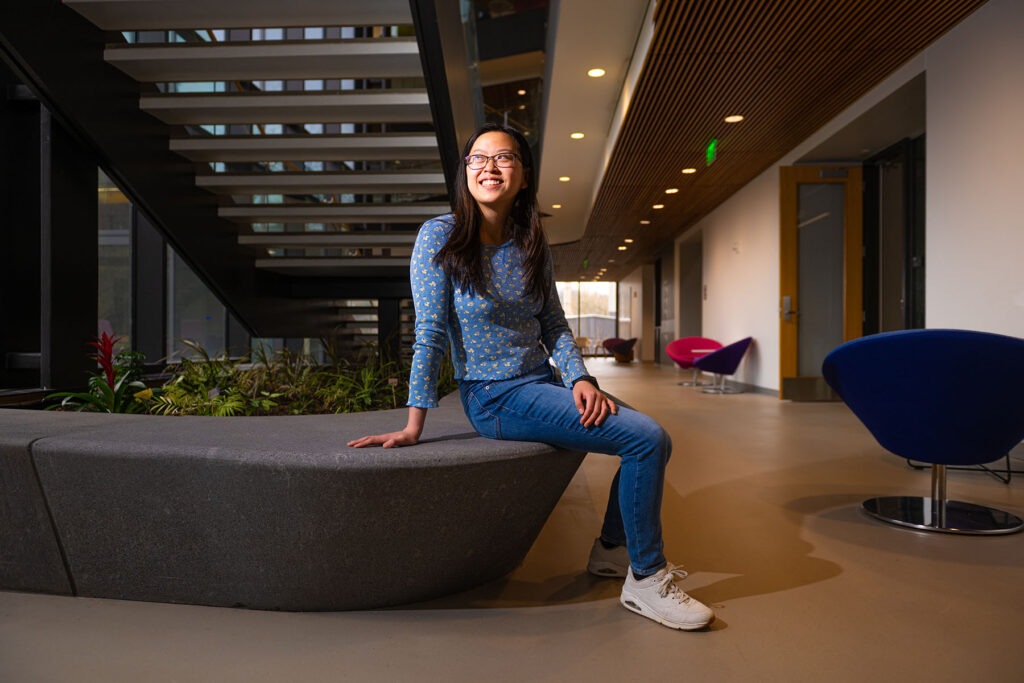Lafayette College will begin an early celebration of AAPI Heritage Month in April

Socheata Huot ’25, Camsey Noonan ’26, Emily Rotola ’24, and Susanna Hontz ’24 (left to right) are among the student leaders who organize activities to celebrate AAPI month.
By: Genamarie McCant
This week, the Office of Intercultural Development (OID), Asian Cultural Association (ACA), Asian studies program, and the Lafayette campus community will begin an early celebration of Asian American and Pacific Islander (AAPI) Heritage Month, honoring the achievements and cultural contributions of Asian Americans, Native Hawaiians, and Pacific Islanders.
The month is meant to honor the achievements and contributions of Asian Americans, Native Hawaiians, and Pacific Islanders in the United States. Although AAPI month is celebrated nationally in May, the College has opted to celebrate in April this year due to the presence of students on campus. By commemorating the month earlier in the academic year, the College aims to promote awareness, appreciation, and understanding of AAPI culture and experiences within and beyond the Lafayette community.
Emily Rotola ’24, ACA co-president, believes that celebrating and acknowledging all facets of the AAPI identity fosters empathy and inclusivity. “So often AAPI communities are underrepresented or misrepresented, and I think that this month can help celebrate the diversity within AAPI communities and can help bring awareness to AAPI issues,” she says. “I think it is great to celebrate and speak out about all aspects of the AAPI identity and community. Learning more about different people and cultures can help us regain empathy, which I think needs to be emphasized in society today. It is important to celebrate everyone’s AAPI identity and be inclusive, and that is what we try to do during AAPI month.”

Emily Rotola ’24
So often AAPI communities are underrepresented or misrepresented, and I think that this month can help celebrate the diversity within AAPI communities and can help bring awareness to AAPI issues. I think it is great to celebrate and speak out about all aspects of the AAPI identity and community. Learning more about different people and cultures can help us regain empathy, which I think needs to be emphasized in society today. It is important to celebrate everyone’s AAPI identity and be inclusive, and that is what we try to do during AAPI month.
Karina Fuentes, OID’s associate director, hopes that students continue to educate themselves on all cultural identities that exist within the Lafayette community. “In this month, we encourage the community to come and support our programming and obtain a book to further understand who is in the room and to learn more about the Asian, Asian American, Native Hawaiian, and Pacific Islander community,” she says. “OID has always seen the importance of the AAPI identity several Lafayette scholars have. We acknowledge and celebrate this community for their contributions and dedication to our society and as Lafayette scholars their work in educating others on their lived experiences each day. This heritage month celebration aims to recognize who these individuals are, what they have contributed in the past, and how they have shaped this country for a brighter future.”
The College’s upcoming heritage month includes an engaging variety of events designed to celebrate and explore the diverse cultures within the AAPI community. The month’s programming features a visit from mokuhanga (Japanese woodblock print) artist Patty Hudak April 22-23. The artist will be visiting several classrooms, working with students enrolled in Asian studies classes, and will also lead student workshops involving hands-on demonstrations.
An AAPI faculty panel will take place on May 3 at 12 p.m., and a film screening on the Quad of Polite Society, April 27 at 8 p.m.
The month’s celebrations also include an eagerly anticipated excursion to Philly Chinatown on April 24, a kickoff event in Farinon Atrium on April 16, and a keynote speaker to promote insightful discussion and appreciation for AAPI heritage on April 23 at 6:20 p.m. in Oechsle Hall. The event at Farinon will feature a book giveaway, exciting prize opportunities, and an opportunity to participate in popping boba tea making.
“I am looking forward to the faculty panel,” says Rotola. “Hearing from professors is a great way to understand how their identity has impacted their careers. Furthermore, I am looking forward to the mokuhanga workshop as I think a great way to learn about and engage with a culture is to understand their art.”
Every year, Seo-Hyun Park, chair of the Asian studies program and associate professor in government and law, collaborates with a group of dedicated student leaders on campus. Together, they have a shared interest and a sense of pride in celebrating AAPI culture and history.
“One of the strengths of the AAPI community is our diversity. At the same time, the term AAPI reflects a complicated history, one that tries to bring together the very different experiences of various Asian immigrants and Pacific Islanders into a single identity group,” she says. “AAPI Heritage Month gives us an opportunity to explore all these important and fraught aspects of community-building while thinking about the AAPI community’s place and role in the broader struggle against racism. May isn’t the only month we should be contemplating these important issues, but AAPI Heritage Month can serve as a focal point for highlighting and renewing our shared efforts toward a more equitable and just society.”
Park finds profound significance in the connections fostered with students both inside and outside the classroom, enjoying seeing her students shine as activists and leaders. During her tenure as Asian studies program chair, she has witnessed the extraordinary initiative, imagination, and energy of the AAPI board, and of her trusted partners and collaborators from student organizations such as Asian Cultural Association (ACA), Refugee Action (RefAct), and South Asian Students Association (SASA).
Under her leadership, the Asian studies program also has established strong partnerships with various departments and entities on campus that have provided timely support and funds, including but not limited to: the film and media studies program, Hanson Center, OID, and Provost’s Office.



